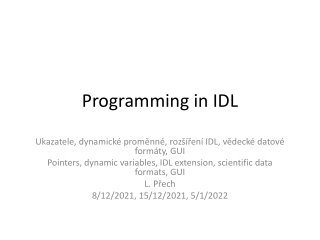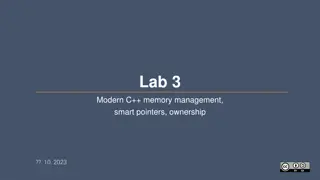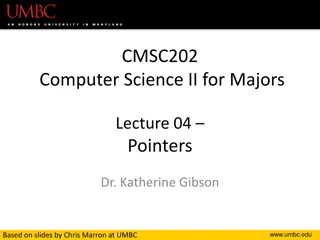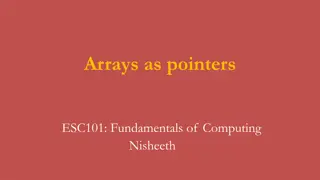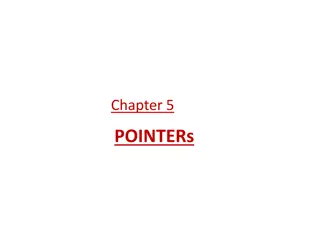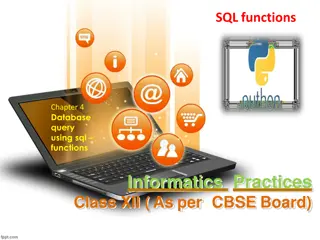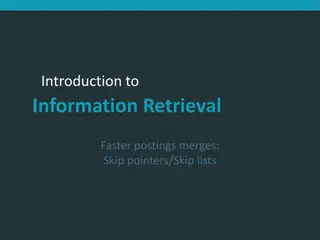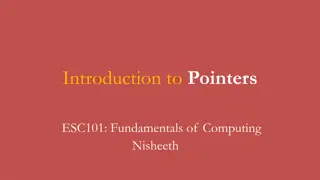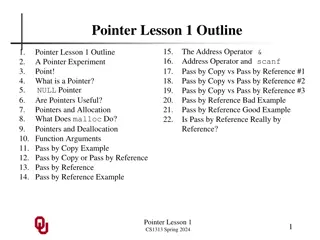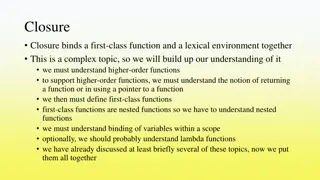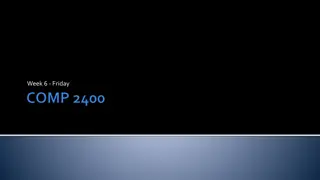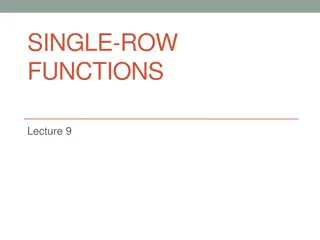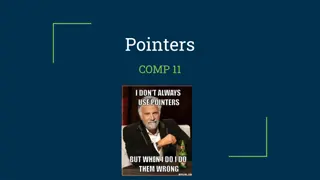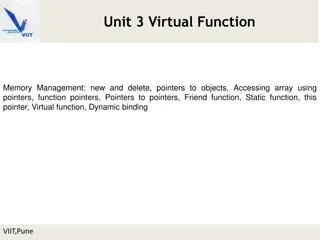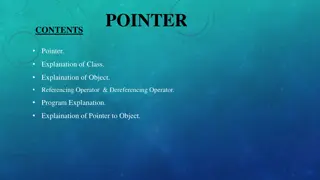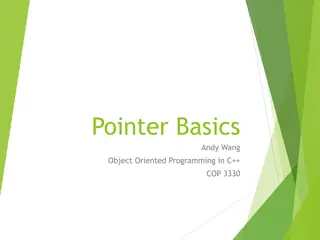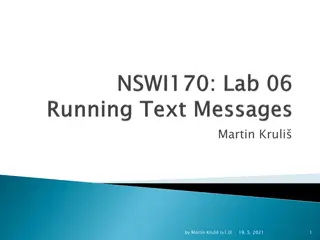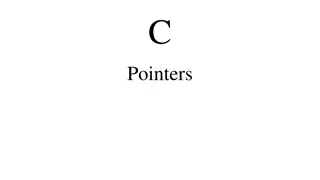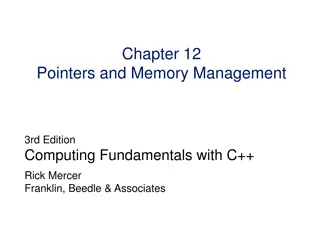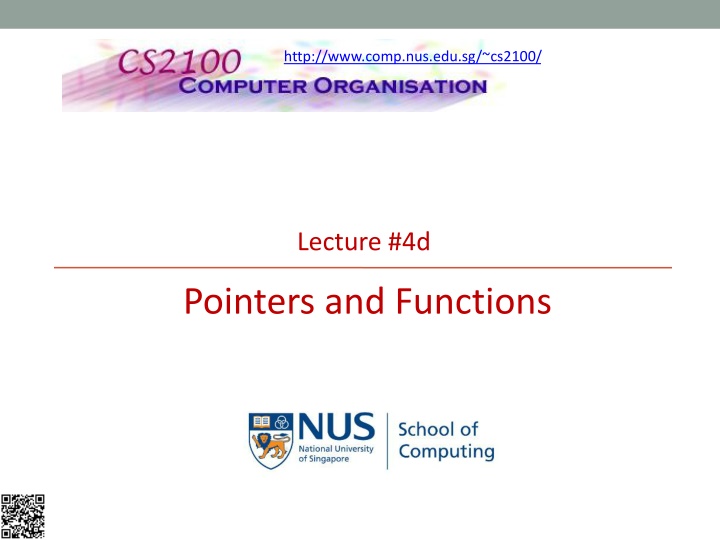
Pass-by-Value and Scope Rules in C Programming
Learn about pass-by-value mechanism, scope rules, and local variables in C programming through an insightful lecture by Aaron Tan from NUS. Explore examples and explanations to deepen your understanding of how parameters are passed and variables are scoped in functions.
Download Presentation

Please find below an Image/Link to download the presentation.
The content on the website is provided AS IS for your information and personal use only. It may not be sold, licensed, or shared on other websites without obtaining consent from the author. If you encounter any issues during the download, it is possible that the publisher has removed the file from their server.
You are allowed to download the files provided on this website for personal or commercial use, subject to the condition that they are used lawfully. All files are the property of their respective owners.
The content on the website is provided AS IS for your information and personal use only. It may not be sold, licensed, or shared on other websites without obtaining consent from the author.
E N D
Presentation Transcript
http://www.comp.nus.edu.sg/~cs2100/ Lecture #4d Pointers and Functions
Questions? IMPORTANT: DO NOT SCAN THE QR CODE IN THE VIDEO RECORDINGS. THEY NO LONGER WORK Ask at https://sets.netlify.app/module/676ca3a07d7f5ffc1741dc65 OR Scan and ask your questions here! (May be obscured in some slides)
Aaron Tan, NUS Lecture #4: Pointers and Functions 3 4. Pass-by-Value and Scope Rule (1/4) In C, the actual parameters are passed to the formal parameters by a mechanism known as pass-by-value. a b int main(void) { 10.5 7.8 double a = 10.5, b = 7.8; printf("%.2f\n", sqrt_sum_square(3.2, 12/5); printf("%.2f\n", sqrt_sum_square(a, a+b); return 0; } Actual parameters: 3.2 and 2.0 10.5 and 18.3 Formal parameters: double sqrt_sum_square(double x, double y) { x y double sum_square; sum_square = pow(x,2) + pow(y,2); return sqrt(sum_square); } 3.2 10.5 2.0 18.3
Aaron Tan, NUS Lecture #4: Pointers and Functions 4 4. Pass-by-Value and Scope Rule (2/4) Formal parameters are local to the function they are declared in. Variables declared within the function are also local to the function. Local parameters and variables are only accessible in the function they are declared scope rule. When a function is called, an activation record is created in the call stack, and memory is allocated for the local parameters and variables of the function. Once the function is done, the activation record is removed, and memory allocated for the local parameters and variables is released. Hence, local parameters and variables of a function exist in memory only during the execution of the function. They are called automatic variables. In contrast, static variables exist in the memory even after the function is executed.
Aaron Tan, NUS Lecture #4: Pointers and Functions 5 4. Pass-by-Value and Scope Rule (3/4) What s wrong with this code? int f(int); Answer: Variable a is local to main(), not f(). Hence, variable a cannot be used in f(). int main(void) { int a; ... } int f(int x) { return a + x; }
Aaron Tan, NUS Lecture #4: Pointers and Functions 6 4. Pass-by-Value and Scope Rule (4/4) Trace this code by hand and write out its output. In main, before: a=2, b=3 In g, before: a=2, b=3 In g, after : a=102, b=203 In main, after : a=2, b=3 A void function is a function that does not return any value. #include <stdio.h> void g(int, int); int main(void) { int a = 2, b = 3; printf("In main, before: a=%d, b=%d\n", a, b); g(a, b); printf("In main, after : a=%d, b=%d\n", a, b); return 0; } main addr name val _ a 2 _ b 3 void g(int a, int b) { printf("In g, before: a=%d, b=%d\n", a, b); a = 100 + a; b = 200 + b; printf("In g, after : a=%d, b=%d\n", a, b); } g addr name val _ a 2 102 _ b 3 203 PassByValue.c
Aaron Tan, NUS Lecture #4: Pointers and Functions 7 4.1 Consequence of Pass-by-Value Can this code be used to swap the values in a and b? In main, before: a=2, b=3 In main, after : a=2, b=3 #include <stdio.h> void swap(int, int); int main(void) { int a = 2, b = 3; No printf("In main, before: a=%d, b=%d\n", a, b); swap(a, b); printf("In main, after : a=%d, b=%d\n", a, b); return 0; } void swap(int a, int b) { int temp = a; a = b; b = temp; } SwapIncorrect.c
Aaron Tan, NUS Lecture #4: Pointers and Functions 8 5. Function with Pointer Parameters (1/3) A function may not return any value (called a void function), or it may return a value. All parameters and variables in a function are local to the function (scope rule). Arguments from a caller are passed by value to a function s parameters. How do we then allow a function to return more than one value, or modify values of variables defined outside it? An example is swapping two variables. How can we write a function to do that? The previous slide shows a negative example.
Aaron Tan, NUS Lecture #4: Pointers and Functions 9 5. Function with Pointer Parameters (2/3) What happens in SwapIncorrect.c? It s all about pass-by-value and scope rule! a b In main(): 2 3 a b In swap(): 2 3 3 2 No way for swap() to modify the values of variables that are outside its scope (i.e. a and b), unless...
Aaron Tan, NUS Lecture #4: Pointers and Functions 10 5. Function with Pointer Parameters (3/3) The only way for a function to modify the value of a variable outside its scope, is to find a way for the function to access that variable Solution: Use pointers! a b In main(): 2 3 ptr1 ptr2 In swap():
Aaron Tan, NUS Lecture #4: Pointers and Functions 11 5.1 Function To Swap Two Variables 3 2 #include <stdio.h> a b In main(): 2 3 void swap(int *, int *); int main(void) { int a, b; In swap():ptr1 ptr2 printf("Enter two integers: "); scanf("%d %d", &var1, &var2); swap( &a, &b ); printf("var1 = %d; var2 = %d\n", var1, var2); return 0; } void swap(int *ptr1, int *ptr2) { int temp; temp = *ptr1; *ptr1 = *ptr2; *ptr2 = temp; } SwapCorrect.c
Aaron Tan, NUS Lecture #4: Pointers and Functions 12 5.2 Examples (1/4) Example1.c #include <stdio.h> void f(int, int, int); int main(void) { int a = 9, b = -2, c = 5; f(a, b, c); printf("a = %d, b = %d, c = %d\n", a, b, c); return 0; } a b c 9 -2 5 x y z void f(int x, int y, int z) { x = 3 + y; y = 10 * x; z = x + y + z; printf("x = %d, y = %d, z = %d\n", x, y, z); } 9 -2 5 1 16 10 x = 1, y = 10, z = 16 a = 9, b = -2, c = 5
Aaron Tan, NUS Lecture #4: Pointers and Functions 13 5.2 Examples (2/4) Example2.c #include <stdio.h> void f(int *, int *, int *); 1 10 16 int main(void) { int a = 9, b = -2, c = 5; f(&a, &b, &c); printf("a = %d, b = %d, c = %d\n", a, b, c); return 0; } a b c 9 -2 5 x y z void f(int *x, int *y, int *z) { *x = 3 + *y; *y = 10 * *x; *z = *x + *y + *z; printf("*x = %d, *y = %d, *z = %d\n", *x, *y, *z); } *x = 1, *y = 10, *z = 16 a = 1, b = 10, c = 16 *x is a, *y is b, and *z is c!
Aaron Tan, NUS Lecture #4: Pointers and Functions 14 5.2 Examples (3/4) Example3.c #include <stdio.h> void f(int *, int *, int *); int main(void) { int a = 9, b = -2, c = 5; f(&a, &b, &c); printf("a = %d, b = %d, c = %d\n", a, b, c); return 0; } Compiler warnings, because x, y, z are NOT integer variables! They are addresses (or pointers). void f(int *x, int *y, int *z) { *x = 3 + *y; *y = 10 * *x; *z = *x + *y + *z; printf("x = %d, y = %d, z = %d\n", x, y, z); }
Aaron Tan, NUS Lecture #4: Pointers and Functions 15 5.2 Examples (4/4) Example4.c #include <stdio.h> void f(int *, int *, int *); int main(void) { int a = 9, b = -2, c = 5; f(&a, &b, &c); printf("a = %d, b = %d, c = %d\n", a, b, c); return 0; } void f(int *x, int *y, int *z) { *x = 3 + *y; *y = 10 * *x; *z = *x + *y + *z; printf("x = %p, y = %p, z = %p\n", x, y, z); } x = ffbff78c, y = ffbff788, z = ffbff784 a = 1, b = 10, c = 16 Addresses of variables a, b and c. (Values change from run to run.) Use %p for pointers.
Aaron Tan, NUS Lecture #4: Pointers and Functions 16 Quiz Please complete Pointers and Functions Quiz 2 before 3 pm on 23 August 2022.
Aaron Tan, NUS Lecture #4: Pointers and Functions 17 End of File

